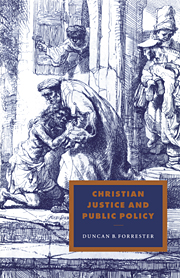Introduction
Published online by Cambridge University Press: 02 November 2009
Summary
This is a book about the practice of justice. The Christian position from which I write assumes that both knowing what justice is and doing justice are inherently and deeply problematic. Human beings have an in-built propensity to distort ideas of justice and manipulate them so that they are compatible with our interests and desires, and, at the extreme, disguise our selfishness and exploitation as morally acceptable. And even when we believe we know what justice is in a particular situation, and its demands are recognised as having a claim on us, we frequently fail to act justly. This is the perennial human predicament recognised by Paul when he wrote, ‘The good which I want to do, I fail to do; but what I do is the wrong which is against my will.’ There is in us a deep in-built resistance to acting justly, and a reluctance to recognise justice. These are reinforced by the powerful forces of collective selfishness and by the human reluctance to face the realities of our motivation.
These constant elements in the human condition have been complicated in modern times by profound uncertainties about what justice is, which add to the difficulties facing those who try conscientiously to act justly. Because understandings of justice are so varied, volatile and confusing, administering justice and attempting to frame and apply policies that are just become perplexing and systematically confusing operations. In many areas of life, as I attempt to show, the problems for people on the ground who feel a calling to act justly and dispense justice are acute.
- Type
- Chapter
- Information
- Christian Justice and Public Policy , pp. 1 - 6Publisher: Cambridge University PressPrint publication year: 1997

